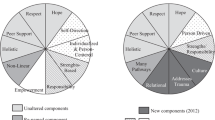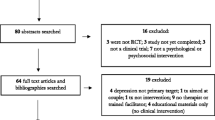Abstract
Background
The process of translating scientific findings into clinical and public health settings has only recently received priority attention within the scientific community.
Purpose
Fueled by “Funding Opportunity Announcements” from the National Institutes of Health and Centers for Disease Control and Prevention, scientists have begun to explore the pathways to effectively “transfer” promising research accomplishments into effective and sustainable service programs within the health care delivery system.
Method
Using Glasgow’s RE-AIM (Reach, Effectiveness, Adoption, Implementation and Maintenance) model as a guide, this research team enrolled 428 socially disadvantaged, culturally diverse women living with HIV/AIDS to test the dissemination and implementation of an evidence-based behavioral intervention designed to improve and sustain the physical and emotional health of participants into the Community Health Center (CHC) setting when conducted by trained CHC staff.
Results
Findings demonstrate the ability of trained CHC staff group leaders to attain results equivalent or superior to those achieved when conducted by research staff on the three principal study outcomes: depression, medication adherence and HIV viral load. Four of five CHCs involved in the study also identified and successfully obtained funding to continue to run intervention groups, supporting the adoption and sustainability components of the translation model.
Conclusion
This study confirmed (a) the “translatability” of the Stress Management And Relaxation Training/Emotional Supportive Therapy (SMART/EST) Women’s Program, from academic to CHC settings in two geographic regions with high HIV prevalence among women, (b) the ability of local staff (using the “train the trainer” model) to successfully achieve program fidelity and clinical outcomes, and (c) the sustainability the program beyond the auspices of research support, through supportive CHC leadership securing continued program funding.




Similar content being viewed by others
References
Kelly JA, Somlai AM, DiFrancisco WJ, et al. Bridging the gap between the science and the service of HIV prevention: transferring effective research-based HIV prevention interventions to community AIDS service providers. Am J Public Health. 2002;90:1082–8.
Weiss SM, Tobin JN, Antoni M, et al. The SMART/EST Women’s Team. Enhancing the health of women living with HIV: the SMART/EST Women’s Project. Int J Womens Health. 2011;3:63–77.
Weiss SM, Jones DL, Lopez MR, et al. The many faces of translational research: a tale of two studies. Transl Behav Med. 2011;78:593–604.
Jones D, Weiss SM, Malow RM, et al. A brief sexual barrier intervention for women living with AIDS: acceptability, use and ethnicity. J Urban Health. 2001;78:593–604.
Jones D, Ishii M, LaPerriere A, et al. Influencing medication adherence among women with AIDS. AIDS Care. 2003;15:463–74.
Jones D, Owens M, Kumar M, et al. The effect of relaxation interventions on cortisol levels in HIV-sero-positive women. J Int Assoc Provid AIDS Care. 2013. doi:10.1177/2325957413488186.
Jones D, MacPherson-Baker S, Lydston D, et al. Influencing medication adherence among HIV+ women: the SMART/EST II Women’s Project. AIDS Behav. 2007;11:79–86.
Jones D, Owens MI, Lydston D, et al. Self efficacy and distress in women with AIDS: the SMART/EST Women’s Project. AIDS Care. 2010;14:1–10.
Lopez E, Jones D, Ishii M, et al. HIV Medication adherence and substance use: the SMART/EST Women’s Project. Am J Infect Dis. 2007;3:240–7.
Segal-Isaacson CJ, Tobin JN, Weiss SM, et al. Improving dietary habits in disadvantaged women with HIV/AIDS: the SMART/EST Women’s Project. AIDS Behav. 2006;10:659–70.
Ironson G, Weiss S, Lydston D, et al. The impact of improved self-efficacy on HIV viral load and distress in culturally diverse women living with AIDS: the SMART/EST Women’s Project. AIDS Care. 2005;17:222–36.
LaPerriere A, Ironson G, Antoni H, et al. Decreased depression up to one year following CBSM+ intervention in depressed women with AIDS: the SMART/EST women's project. J Health Psychol. 2005;10:223–31.
Lechner SC, Antoni MH, Lydston D, et al. Cognitive–behavioral interventions improve quality of life in women with AIDS. J Psychosom Res. 2003;54:253–61.
Lifson AR et al. INSIGHT Endpoint Review Committee Writing Group. Development of diagnostic criteria for serious non-AIDS events in HIV clinical trials. HIV Clin Trials. 2010;11:205–19.
Glasgow ER, Lichtenstein E, Marcus AC. Why don’t we see more translation of health promotion research to practice? Rethinking the efficacy-to-effectiveness translation. Am J Public Health. 1993;93:1261–7.
Jones DL, Lopez M, Simons H, et al. Translation of a comprehensive health behavior intervention for women living with HIV: the SMART/EST Women’s Program. Transl Behav Med. 2013;3:416–25.
Beck AT, Steer RA, Ball R, et al. Comparison of Beck Depression Inventories-IA and -II in psychiatric outpatients. J Pers Assess. 1996;67:588–97.
Segal DL, Coolidge FL, Cahill BS, et al. Psychometric properties of the Beck Depression Inventory II (BDI-II) among community-dwelling older adults. Behav Modif. 2008;32:3–20.
Lipps GE, Lowe GA, De La Haye W, et al. Validation of the Beck Depression Inventory II in HIV-positive patients. West Indian Med J. 2010;59:374–9.
Kagee A, Nel A, Saal W. Factor structure of the Beck Depression Inventory-II among South Africans receiving antiretroviral therapy. AIDS Care. 2014;26:257–62.
Chesney MA, Ickovics JR, Chambers DB, et al. Self-reported adherence to antiretroviral medications among participants in HIV clinical trials: the AACTG adherence instruments. Patient Care Committee & Adherence Working Group of the Outcomes Committee of the Adult AIDS Clinical Trials Group (AACTG). AIDS Care. 2000;12:255–66.
Spiegel D, Butler LD, Giese-Davis J, et al. Effects of supportive–expressive group therapy on survival of patients with metastatic breast cancer: a randomized prospective trial. Cancer. 2007;110:1130–8.
Sikkema KJ, Hansen NB, Kochman A, et al. Outcomes from a randomized controlled trial of a group intervention for HIV positive men and women coping with AIDS-related loss and bereavement. Death Stud. 2004;28:187–209.
Gayner B, Esplen MJ, DeRoche P, et al. A randomized controlled trial of mindfulness-based stress reduction to manage affective symptoms and improve quality of life in gay men living with HIV. J Behav Med. 2012;35:272–85.
Heckman TG, Carlson B. A randomized clinical trial of two telephone-delivered, mental health interventions for HIV-infected persons in rural areas of the United States. AIDS Behav. 2007;11:5–14.
McCain NL, Gray DP, Elswick RK, et al. A randomized clinical trial of alternative stress management interventions in persons with HIV infection. J Consult Clin Psychol. 2008;76:431–41.
Purcell DW, Latka MH, Metsch LR, the INSPIRE Study Team, et al. Results from a randomized controlled trial of a peer-mentoring intervention to reduce HIV transmission and increase access to care and adherence to HIV medications among HIV-seropositive injection drug users. J Acquir Immune Defic Syndr. 2007;46 Suppl 2:S35–47.
Kalichman SC, Rompa D, Cage M, et al. Effectiveness of an intervention to reduce HIV transmission risks in HIV-positive people. Am J Prev Med. 2001;21:84–92.
Koblin BA, Bonner S, Powell B, et al. A randomized trial of a behavioral intervention for black MSM: the DiSH study. AIDS. 2012;26:483–8.
Brimmer DJ, McCleary KK, Lupton TA, et al. A train-the-trainer education and promotion program: chronic fatigue syndrome—a diagnostic and management challenge. BMC Med Educ. 2008;8:49.
Acknowledgements
The authors gratefully acknowledge support for these studies from Centers for Disease Control and Prevention R18PS000829, and National Institutes of Health/National Institutes of Mental Health R01MH55463 and R01MH61208. UMMSM Health Centers: Borinquen Health Center (Miami FL) and Jackson Memorial Hospital Special Immunology Clinic (Miami FL). UMMSM Staff: Olga Villar-Loubet, PsyD, Eliot Lopez, PhD, Laura Bruscantini, and Szonja Vamos. UMMSM CHC Facilitators: Oscar Galeon, Madeline Clemente, Phonia Theoc, Sheila Findlay, Samantha Ross, and Joel Jean Baptiste. CDN Health Centers: Bedford-Stuyvesant Family Health Center (Brooklyn, NY), Morris Heights Health Center (Bronx, NY), Metropolitan Family Health Center/Jersey City Family Health Center (Jersey City NJ). CDN Staff: Marleny Diaz-Gloster, MPH, Jafar Abbas, Rosario Hinojosa, Fidel Martinez, Jessica Pesantez, PsyD, and Barbara Warren, PsyD. CDN CHC Facilitators: Enid Knight, Ellen Cates, Eileen Scarinici, Tonya Williams, Elisha Cherry, William Mendez, Patricia Ospina, and Jennifer Collazo.
Conflicts of Interest
The authors have no conflicts of interest to declare.
Author information
Authors and Affiliations
Corresponding author
Rights and permissions
About this article
Cite this article
Weiss, S.M., Tobin, J.N., Lopez, M. et al. Translating an Evidence-Based Behavioral Intervention for Women Living with HIV into Clinical Practice: The SMART/EST Women’s Program. Int.J. Behav. Med. 22, 415–424 (2015). https://doi.org/10.1007/s12529-014-9399-1
Published:
Issue Date:
DOI: https://doi.org/10.1007/s12529-014-9399-1




